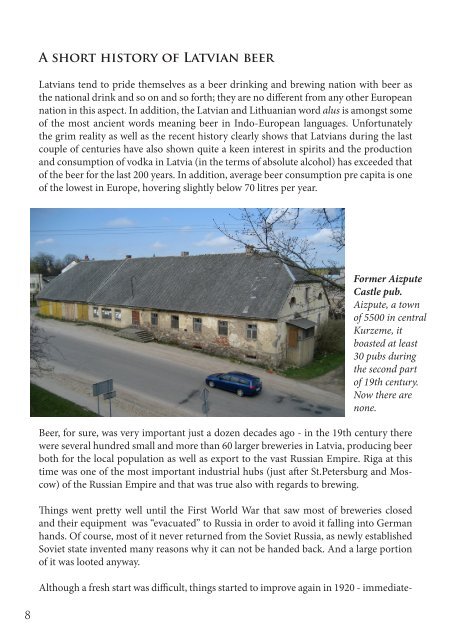Create successful ePaper yourself
Turn your PDF publications into a flip-book with our unique Google optimized e-Paper software.
8<br />
A short history of Latvian <strong>beer</strong><br />
Latvians tend to pride themselves as a <strong>beer</strong> drinking and brewing nation with <strong>beer</strong> as<br />
the national drink and so on and so forth; they are no different from any other European<br />
nation in this aspect. In addition, the Latvian and Lithuanian word <strong>alus</strong> is amongst some<br />
of the most ancient words meaning <strong>beer</strong> in Indo-European languages. Unfortunately<br />
the grim reality as well as the recent history clearly shows that Latvians during the last<br />
couple of centuries have also shown quite a keen interest in spirits and the production<br />
and consumption of vodka in Latvia (in the terms of absolute alcohol) has exceeded that<br />
of the <strong>beer</strong> for the last 200 years. In addition, average <strong>beer</strong> consumption pre capita is one<br />
of the lowest in Europe, hovering slightly below 70 litres per year.<br />
Former Aizpute<br />
Castle pub.<br />
Aizpute, a town<br />
of 5500 in central<br />
Kurzeme, it<br />
boasted at least<br />
30 pubs during<br />
the second part<br />
of 19th century.<br />
Now there are<br />
none.<br />
Beer, for sure, was very important just a dozen decades ago - in the 19th century there<br />
were several hundred small and more than 60 larger breweries in Latvia, producing <strong>beer</strong><br />
both for the local population as well as export to the vast Russian Empire. Riga at this<br />
time was one of the most important industrial hubs (just after St.Petersburg and Moscow)<br />
of the Russian Empire and that was true also with regards to brewing.<br />
Things went pretty well until the First World War that saw most of breweries closed<br />
and their equipment was “evacuated” to Russia in order to avoid it falling into German<br />
hands. Of course, most of it never returned from the Soviet Russia, as newly established<br />
Soviet state invented many reasons why it can not be handed back. And a large portion<br />
of it was looted anyway.<br />
Although a fresh start was difficult, things started to improve again in 1920 - immediate-<br />
ly after the independence was gained. About 100 breweries re-opened, the future started<br />
to look bright, despite the loss of the largest export market - Russia. Unfortunately this<br />
development lasted only till 1925 when new anti-alcohol measures were passed that saw<br />
70% of the breweries closing during the following years and the total output dropping by<br />
almost 40%. Although these laws were repelled in a few years time, commercial production<br />
of the <strong>beer</strong> was further hampered by extortionate import tax, incredibly high excise<br />
duties (the highest in Europe during that time) and a cartel of five largest Latvian brewers<br />
that resulted in high prices - from double to triple compared to those e.g. in Germany<br />
during that time. It meant that average worker simply could not afford to drink commercial<br />
<strong>beer</strong> and spirits provided much better price/drunkness ratio. This is verified by<br />
the official statistics that shows that in 1927 only 3.5 liters!!! of <strong>beer</strong> annually per person<br />
were consumed (15 - 25 times less than in pre-war years) in Latvia. There is no doubt the<br />
actual consumption was many times greater, as most of the <strong>beer</strong> was produced by homebrewing.<br />
Still, the government policies during the 1920s and 1930s can be considered as<br />
the most severe blow to the Latvian <strong>beer</strong> industry (surpassing even changes caused by<br />
the both World Wars) that caused most of the smaller breweries to close and paved the<br />
way to mass-produced and boring <strong>beer</strong>.<br />
In 1937 the authoritanian regime of Kārlis Ulmanis decided that foreign capital is not<br />
needed in a healthy nationalist state. The most succesful businesses in all industries were<br />
simply taken away from their owners, but at least they were adequately compensated for<br />
their loss. Similar things took place also in the brewing industry - three breweries “voluntary”<br />
sold their operations to the state that established a new central brewery, called<br />
Aldaris. It is interesting that the necessity to nationalise a significant portion of the brewing<br />
industry was explained by arguing that the <strong>beer</strong> was becoming too expensive for ordinary<br />
Latvian peasants that were the backbone of the great Latvian nation. Never mind<br />
Former Aizpute<br />
brewery.<br />
Established in the<br />
19th century, the<br />
brewery finally<br />
ceased operations<br />
during the 1950s.<br />
9


